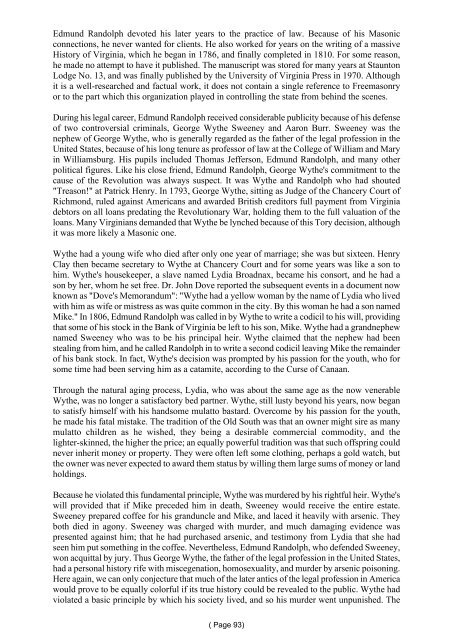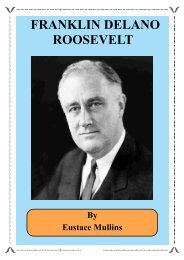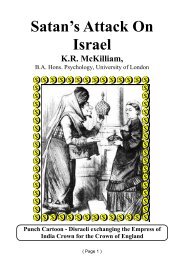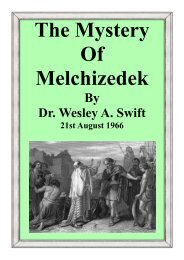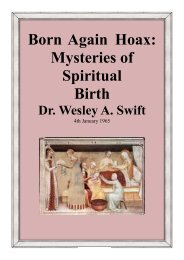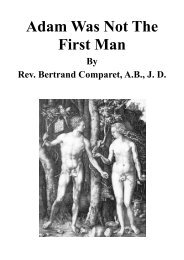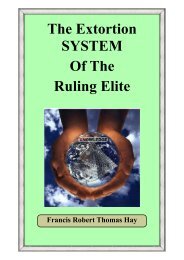Curse of Cannan - The New Ensign
Curse of Cannan - The New Ensign
Curse of Cannan - The New Ensign
Create successful ePaper yourself
Turn your PDF publications into a flip-book with our unique Google optimized e-Paper software.
Edmund Randolph devoted his later years to the practice <strong>of</strong> law. Because <strong>of</strong> his Masonic<br />
connections, he never wanted for clients. He also worked for years on the writing <strong>of</strong> a massive<br />
History <strong>of</strong> Virginia, which he began in 1786, and finally completed in 1810. For some reason,<br />
he made no attempt to have it published. <strong>The</strong> manuscript was stored for many years at Staunton<br />
Lodge No. 13, and was finally published by the University <strong>of</strong> Virginia Press in 1970. Although<br />
it is a well-researched and factual work, it does not contain a single reference to Freemasonry<br />
or to the part which this organization played in controlling the state from behind the scenes.<br />
During his legal career, Edmund Randolph received considerable publicity because <strong>of</strong> his defense<br />
<strong>of</strong> two controversial criminals, George Wythe Sweeney and Aaron Burr. Sweeney was the<br />
nephew <strong>of</strong> George Wythe, who is generally regarded as the father <strong>of</strong> the legal pr<strong>of</strong>ession in the<br />
United States, because <strong>of</strong> his long tenure as pr<strong>of</strong>essor <strong>of</strong> law at the College <strong>of</strong> William and Mary<br />
in Williamsburg. His pupils included Thomas Jefferson, Edmund Randolph, and many other<br />
political figures. Like his close friend, Edmund Randolph, George Wythe's commitment to the<br />
cause <strong>of</strong> the Revolution was always suspect. It was Wythe and Randolph who had shouted<br />
"Treason!" at Patrick Henry. In 1793, George Wythe, sitting as Judge <strong>of</strong> the Chancery Court <strong>of</strong><br />
Richmond, ruled against Americans and awarded British creditors full payment from Virginia<br />
debtors on all loans predating the Revolutionary War, holding them to the full valuation <strong>of</strong> the<br />
loans. Many Virginians demanded that Wythe be lynched because <strong>of</strong> this Tory decision, although<br />
it was more likely a Masonic one.<br />
Wythe had a young wife who died after only one year <strong>of</strong> marriage; she was but sixteen. Henry<br />
Clay then became secretary to Wythe at Chancery Court and for some years was like a son to<br />
him. Wythe's housekeeper, a slave named Lydia Broadnax, became his consort, and he had a<br />
son by her, whom he set free. Dr. John Dove reported the subsequent events in a document now<br />
known as "Dove's Memorandum": "Wythe had a yellow woman by the name <strong>of</strong> Lydia who lived<br />
with him as wife or mistress as was quite common in the city. By this woman he had a son named<br />
Mike." In 1806, Edmund Randolph was called in by Wythe to write a codicil to his will, providing<br />
that some <strong>of</strong> his stock in the Bank <strong>of</strong> Virginia be left to his son, Mike. Wythe had a grandnephew<br />
named Sweeney who was to be his principal heir. Wythe claimed that the nephew had been<br />
stealing from him, and he called Randolph in to write a second codicil leaving Mike the remainder<br />
<strong>of</strong> his bank stock. In fact, Wythe's decision was prompted by his passion for the youth, who for<br />
some time had been serving him as a catamite, according to the <strong>Curse</strong> <strong>of</strong> Canaan.<br />
Through the natural aging process, Lydia, who was about the same age as the now venerable<br />
Wythe, was no longer a satisfactory bed partner. Wythe, still lusty beyond his years, now began<br />
to satisfy himself with his handsome mulatto bastard. Overcome by his passion for the youth,<br />
he made his fatal mistake. <strong>The</strong> tradition <strong>of</strong> the Old South was that an owner might sire as many<br />
mulatto children as he wished, they being a desirable commercial commodity, and the<br />
lighter-skinned, the higher the price; an equally powerful tradition was that such <strong>of</strong>fspring could<br />
never inherit money or property. <strong>The</strong>y were <strong>of</strong>ten left some clothing, perhaps a gold watch, but<br />
the owner was never expected to award them status by willing them large sums <strong>of</strong> money or land<br />
holdings.<br />
Because he violated this fundamental principle, Wythe was murdered by his rightful heir. Wythe's<br />
will provided that if Mike preceded him in death, Sweeney would receive the entire estate.<br />
Sweeney prepared c<strong>of</strong>fee for his granduncle and Mike, and laced it heavily with arsenic. <strong>The</strong>y<br />
both died in agony. Sweeney was charged with murder, and much damaging evidence was<br />
presented against him; that he had purchased arsenic, and testimony from Lydia that she had<br />
seen him put something in the c<strong>of</strong>fee. Nevertheless, Edmund Randolph, who defended Sweeney,<br />
won acquittal by jury. Thus George Wythe, the father <strong>of</strong> the legal pr<strong>of</strong>ession in the United States,<br />
had a personal history rife with miscegenation, homosexuality, and murder by arsenic poisoning.<br />
Here again, we can only conjecture that much <strong>of</strong> the later antics <strong>of</strong> the legal pr<strong>of</strong>ession in America<br />
would prove to be equally colorful if its true history could be revealed to the public. Wythe had<br />
violated a basic principle by which his society lived, and so his murder went unpunished. <strong>The</strong><br />
( Page 93)


